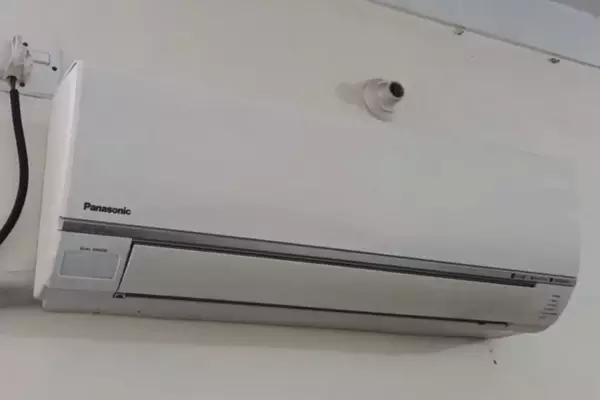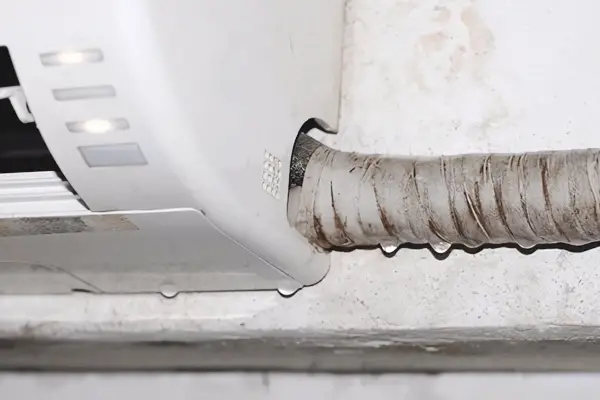Air conditioning systems are vital components of our homes, providing much-needed cooling during hot seasons. At times, you may notice water leaking from your air conditioner, a situation that can be alarming and confusing. This issue warrants immediate attention, primarily due to its potential consequences.
Leaking water from an air conditioner is indeed a concern. It can lead to health hazards and property damage if overlooked. In essence, it disrupts the equilibrium of your living environment and poses a potential risk to your home’s structural integrity.
Having a clear grasp of this issue aids in understanding the measures needed to prevent it. Knowledge of the danger that a leaking air conditioner poses is key to promoting a healthy and safe living environment.
Contents
Common Causes of AC Water Leakage
Air conditioners may leak water due to several reasons. A comprehensive understanding of these causes is essential for effective prevention and resolution.
Drain Line Problems
The drain line, also known as the condensate drain, carries condensation away from the air conditioner. When the drain line is clogged, water can back up and leak into your home.
Dirty Air Filters
Air filters play a crucial role in air conditioners by trapping dirt and other particles. Over time, these filters can become dirty and clogged, blocking the flow of air. This can cause the evaporator coil to freeze and then melt, leading to water leakage.
Low Refrigerant
Similar to dirty air filters, low refrigerant levels can cause the evaporator coil to freeze and melt, resulting in water leakage. Additionally, low refrigerant can make the air conditioner operate inefficiently.
Condensate Pump Problems
Some air conditioners have a condensate pump to push water outdoors. If this pump is broken, water can accumulate and eventually leak.

Is Leaking Water from AC Dangerous?
Beyond the inconvenience, leaking water from an air conditioner should be taken seriously due to the significant health and property risks it presents. Let’s delve deeper into these risks to provide a better understanding of why addressing such an issue promptly is vital.
Impact on Health
When your air conditioner leaks, it creates a damp and humid environment in your home. Such conditions are perfect for the growth of organisms like mold and mildew. Long-term exposure to mold spores can lead to a variety of health issues. These include:
- Allergic reactions: People with allergies may experience severe reactions when exposed to mold. Symptoms can include itchy eyes, runny nose, coughing, and sneezing. In some cases, mold exposure can cause a severe asthma attack.
- Respiratory problems: The presence of mold spores in your home’s air can lead to respiratory issues even in people without allergies. Persistent cough, difficulty breathing, wheezing, and chest tightness are common symptoms.
- Neurological problems: Some types of mold produce mycotoxins, which can lead to neurological problems when people are exposed to large amounts over time. Symptoms can range from headaches and dizziness to memory loss and cognitive impairment.
Impact on Property
Leaking water from an air conditioner doesn’t only affect your health, but it also poses serious risks to your property.
- Structural Damage: Continuous water leakage can soak into the building materials of your home, causing structural damage over time. This damage can be expensive to repair and may even impact the value of your property.
- Damage to Belongings: Water can damage almost any material. If your air conditioner is leaking, your furniture, electronics, and other belongings are at risk of water damage.
- Electrical Hazards: Water and electricity are a dangerous combination. If water from a leaking air conditioner comes into contact with electrical outlets, it can create a serious fire risk.

Health Implications of AC Water Leakage
Let’s expand further on the health implications of water leakage from air conditioners, emphasizing the dangers of mold and mildew growth and the negative impact on air quality.
Mold and Mildew Growth
Mold and mildew thrive in damp conditions and can quickly grow where there’s a water source, such as a leaking air conditioner. These organisms are not only unsightly, but they also pose several health risks:
- Allergy and Asthma Triggers: Mold spores can trigger allergic reactions and exacerbate asthma symptoms. This includes coughing, wheezing, and shortness of breath.
- Respiratory Infections: Prolonged exposure to mold can cause more severe health issues, such as fungal infections in the lungs, particularly in individuals with weakened immune systems.
- Toxic Mold: Certain types of mold, like black mold, produce toxic substances known as mycotoxins. Prolonged exposure can cause neurological problems and, in extreme cases, death.
Air Quality Reduction
When your air conditioner leaks, it can increase the humidity levels inside your home. High humidity can make the air feel heavy and harder to breathe, especially for people with respiratory conditions. Furthermore, excess moisture can lead to condensation on walls and windows, providing an ideal breeding ground for bacteria and mites.
Property Damages from AC Water Leakage
While health implications are a primary concern, one cannot overlook the potential property damage that a leaking air conditioner can cause.
Water Damage to Walls and Floors
Persistent water leakage can lead to substantial damage over time. The water can soak into walls and floors, causing discoloration, swelling, and even structural damage. Not only does this compromise the integrity of your property, but it can also be costly to fix.
Electrical System Damage
Water leakage can also result in serious electrical issues. If water seeps into your electrical system, it can cause power outages, electrical shocks, or even a fire. This is why it’s crucial to handle any water leaks from your air conditioner as soon as possible to prevent catastrophic consequences.
Impact on AC Functionality
Finally, water leakage can impact the functionality of your air conditioner. Excessive water can cause the cooling coils to freeze, which could damage the system. As a result, your air conditioner may not cool your home as effectively, leading to increased energy consumption and higher utility bills.

Dealing with AC Water Leakage
Addressing water leakage from your air conditioner should be a top priority. Not only can it prevent the issues discussed above, but it can also extend the lifespan of your AC unit.
Immediate Steps
Taking immediate action can mitigate the potential damage. Here’s what you can do:
- Turn off the AC unit: This can prevent further leakage and potential electrical hazards.
- Clean up the leaked water: Use towels or a wet/dry vacuum to clean up the water and prevent further damage to your property.
- Inspect the drain line: If you’re comfortable doing so, check for visible blockages in the drain line and remove them.
When to Call a Professional
In some cases, you may need to call in an HVAC professional. This includes situations such as:
- Continued leakage: If water continues to leak after you’ve taken the initial steps, it’s time to call a professional. The cause may be more complicated than a simple blockage.
- Significant water damage: If the leakage has caused significant water damage to your property, it’s best to get professional help to avoid further damage.
- Mold and mildew: If you see signs of mold or mildew, call a professional immediately. They can help clean up the mold and fix the root cause of the problem.
Preventing AC Water Leakage
Preventing water leakage from your air conditioner is the best way to protect your health and your property. Here are some tips:
Regular Maintenance Tips
Regular maintenance can go a long way in preventing water leakage from your air conditioner:
- Clean or replace the air filters regularly: Dirty air filters can cause the cooling coils to freeze and lead to water leakage. Cleaning or replacing the filters regularly can prevent this.
- Keep the condensate drain line clear: A blocked drain line is one of the most common causes of water leakage from air conditioners. Regularly check the line for blockages and clear them.
- Check the refrigerant levels: Low refrigerant levels can cause the cooling coils to freeze, resulting in water leakage. Check the levels regularly and top them up if necessary.
Importance of Professional Inspections
While regular maintenance can prevent many issues, some problems may be more complex. This is where professional inspections come in. Regular inspections by an HVAC professional can identify potential issues before they turn into significant problems, saving you time and money in the long run.
Frequently Asked Questions
Can a leaking air conditioner cause a fire?
Yes, if water leakage from an air conditioner comes into contact with electrical outlets or wiring, it can cause a fire.
Is the water leaking from my air conditioner clean?
While the water itself may not be harmful, if it leaks into your home, it can cause mold and mildew growth, which can have health implications.
What should I do if my air conditioner is leaking water inside?
If your air conditioner is leaking water inside, turn off the AC, clean up the water, and call a professional to diagnose and fix the problem.
Conclusion
A leaking air conditioner poses potential health risks and can cause considerable damage to your property. From encouraging mold growth to damaging your home’s structural integrity, it’s a serious issue that requires immediate attention.
Addressing a leak promptly can save you from unnecessary headaches in the future. Don’t hesitate to involve professionals in resolving the issue; their expertise and knowledge are invaluable in such situations.
Proactive maintenance of your air conditioner is key to preventing water leakage. Regular inspections, clean air filters, and clear drain lines can significantly reduce the chances of leakage, ensuring your home remains comfortable and safe.
